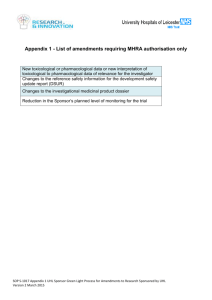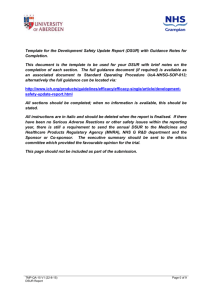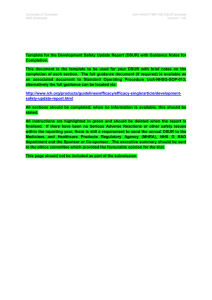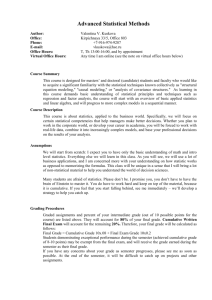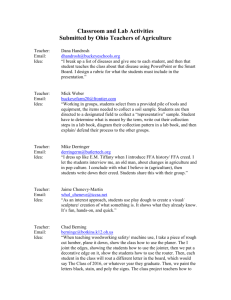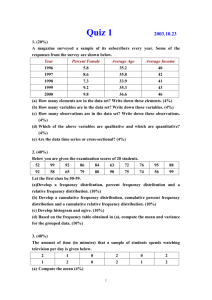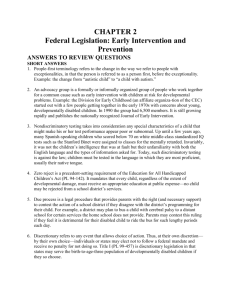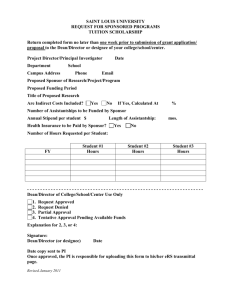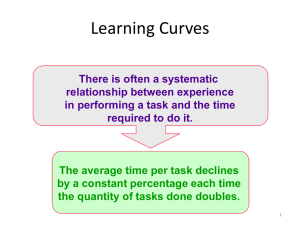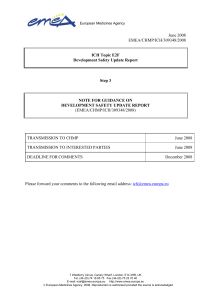Appendix 1 DSUR Template
advertisement
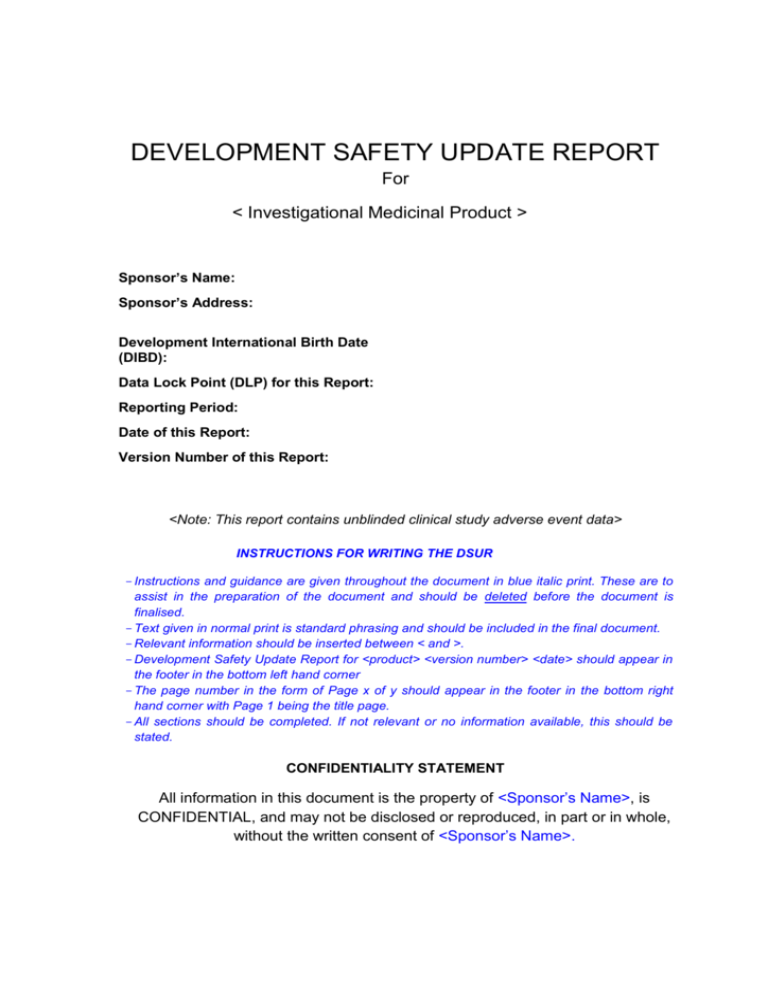
DEVELOPMENT SAFETY UPDATE REPORT For < Investigational Medicinal Product > Sponsor’s Name: Sponsor’s Address: Development International Birth Date (DIBD): Data Lock Point (DLP) for this Report: Reporting Period: Date of this Report: Version Number of this Report: <Note: This report contains unblinded clinical study adverse event data> INSTRUCTIONS FOR WRITING THE DSUR - Instructions and guidance are given throughout the document in blue italic print. These are to assist in the preparation of the document and should be deleted before the document is finalised. - Text given in normal print is standard phrasing and should be included in the final document. - Relevant information should be inserted between < and >. - Development Safety Update Report for <product> <version number> <date> should appear in the footer in the bottom left hand corner - The page number in the form of Page x of y should appear in the footer in the bottom right hand corner with Page 1 being the title page. - All sections should be completed. If not relevant or no information available, this should be stated. CONFIDENTIALITY STATEMENT All information in this document is the property of <Sponsor’s Name>, is CONFIDENTIAL, and may not be disclosed or reproduced, in part or in whole, without the written consent of <Sponsor’s Name>. Executive Summary This should be a concise summary (generally no more than two pages) of the most important information contained within the DSUR. It should be a stand-alone document and should include information on: o Introduction – report version and reporting period o Investigational Medicinal Product (IMP) – mode(s) of action, therapeutic class(es), indication(s)s, dose(s), route(s) of administration, formulation(s) o Estimated cumulative exposure of clinical study participants o Marketing approvals o Summary of overall safety assessment (based on section 18 of DSUR) o Summary of important risks (based on section 19 of DSUR) o Actions taken for safety reasons including changes to the Reference Safety Information o Conclusions Development Safety Update Report for <product> <version number> <date> Page x of y Table of Contents Title page Executive Summary Table of Contents 1. Introduction 2. Worldwide Marketing Approval Status 3. Actions Taken in the Reporting Period for Safety Reasons 4. Changes to Reference Safety Information 5. Inventory of Clinical Studies Ongoing and Completed during the Reporting Period 6. Estimated Cumulative Exposure 6.1 Cumulative Subject Exposure in the Development Programme 6.2 Patient Exposure from Marketing Experience 7. Data in Line Listings and Summary Tabulations 7.1 Reference Information 7.2 Line Listings of Serious Adverse Reactions during the Reporting Period 7.3 Cumulative Summary Tabulations of Serious Adverse Events 8. Significant Findings from Clinical Studies in the Reporting Period 8.1 Completed Clinical Studies 8.2 Ongoing Clinical Studies 8.3 Long-term Follow-up 8.4 Other Therapeutic use of Investigational Drug 8.5 New Safety Data related to Combination Therapies 9. Safety Findings from Non-Interventional Studies 10. Other Clinical Trial / Study Safety Information 11. Safety Findings from Marketing Experience 12. Non-clinical Data 13.. Literature 14. Other DSURs 15. Lack of Efficacy 16. Region-Specific Information 17. Late-Breaking Information 18. Overall Safety Assessment 18.1 Evaluation of the Risks 18.2 Benefit-risk Considerations 19. Summary of Important Risks 20. Conclusions Possible Appendices to the DSUR Signature Page Appendix 1 Appendix 2 Appendix 3 Appendix 4 Development Safety Update Report for <product> <version number> <date> Page x of y Development Safety Update Report for <product> <version number> <date> Page x of y 1. Introduction This section should include: DIBD or IBD (as applicable) Reporting period and sequential number of the report. A brief description of the Investigational Medicinal Product (IMP), including therapeutic class(es), mode of action(s), dose(s), route(s) of administration, formulation(s). A brief summary of the indications and populations being studied A short summary of the scope of the clinical trials covered by the report (e.g. whether the report is for a single clinical trial or for more than one trial with the IMP, indication-specific trials, trials with combinations) A brief description of any particular data excluded. Exclusions should be explained. (e.g. covered in a separate report by a partner company) The rationale for submission of multiple DSURs for the IMP, if applicable Example wording: This is the <Xth> Development Safety Update Report (DSUR) for ‘IMP’ summarising safety data received by [sponsor’s name] from <date> to <date>. The <sponsor’s name>’s CTA was approved on <date> and this is the Development International Birth Date. This document has been compiled in accordance with the ICH E2F (DSUR) guideline, Step 4, September 2010. <IMP> is a <give details of class / mode of action etc>. As of the Data Lock Point (DLP) for this DSUR, <sponsor’s name> is conducting studies as follows <give details of studies and indication(s)>. 2. Worldwide Marketing Approval Status To our knowledge <IMP> is authorised for sale in ……. State date of first approval, indication(s) and approved dose(s). 3. Actions taken in the Reporting Period for Safety Reasons This section should include a description of significant actions related to safety which have already been taken by the Sponsor, Competent Authorities (CAs); Data Safety Monitoring Boards (DSMBs) or Ethics Committees (ECs) which may have an impact on the conduct of a specific study(s) or the whole clinical development programme. The reason(s) for each action should be provided if known. Any relevant updates to Development Safety Update Report for <product> <version number> <date> Page x of y previous actions should be summarised also (e.g. resumption of a clinical trial after suspension). Examples of significant actions include: Actions related to investigational drugs: o o o o o Refusal of authorisation of a clinical study for ethical or safety reasons Partial or complete clinical study suspension or early termination of a clinical study due to lack of efficacy or safety issues Recall of IMP or comparator Failure to obtain marketing approval for a tested indication including voluntary withdrawal of a marketing application Risk Management activities including: - Protocol modifications due to safety or efficacy concerns (e.g. dose changes, changes in inclusion criteria, intensification of monitoring, limitation of trial duration) - Restrictions in study population or indications - Changes to the informed consent document relating to safety issues - Formulation changes - Addition by CAs of a special safety-related reporting requirement - Issuance of a communication to investigators - Plans for new safety studies Actions related to marketed drugs: o o o Failure to obtain a marketing approval renewal Withdrawal or suspensions of a marketing approval Risk management activities including: - Significant restrictions on distribution or introduction of risk minimisation measures - Significant safety-related changes in labelling that could affect the development programme, including restrictions on use or population treated - Communications to healthcare professionals - New post-marketing study requirement(s) imposed by CAs. Summarise any requests from CAs that place a specific limitation on current or future development (e.g., specification of a maximum dose to be evaluated). Provide a cumulative listing of such requests from CAs (including any updates if applicable) as a table in an appendix, or in this section. 4. Changes to Reference Safety Information List any significant safety-related changes to the appropriate Investigator’s Brochure or Summary of Product Characteristics (SPC) for the marketed product within the period of the report. This includes information relating to exclusion criteria, contraindications, warnings, precautions, serious adverse drug reactions, adverse events of special interest, interactions and any important findings from non-clinical Development Safety Update Report for <product> <version number> <date> Page x of y studies. Specific information relevant to these changes should be provided in the appropriate sections of the DSUR. 5. Inventory of Clinical Studies Ongoing and Completed during the Reporting Period This section should provide a brief overview of the clinical studies ongoing and completed by the Sponsor in the reporting period with detailed information presented in a table as an appendix. Separate tables may be provided by indication, formulation and study population if appropriate. For each study give the following information: o o o o o o o o o o o Study ID (Protocol number or other identifier) Phase Status - Ongoing – study has begun, study has begun but is currently on hold, study is completed but final study report is not yet available - Completed – final study report available Countries / regions where there is at least one investigational site for the protocol Abbreviated study title Study design, including treatment arms Dose and regimen of IMP and any comparators Study population Date of First Visit for First patient (FPFV) Planned enrolment for study as a whole Estimate of cumulative number of participants exposed for each treatment arm, where available. Provide the actual enrolment numbers for open or completed trials and/or an estimate based on the randomisation scheme for blinded trials. See Appendix 1 for examples of suitable headings for these tables. 6. Estimated Cumulative Exposure Data should be presented in tabular format. When there are important differences among studies in dose, route of administration, or participant population, note these differences in the tables, or consider separate tables. If the summary tabulations of SAEs are presented by indication, the exposure data should also be presented by indication, when available. When there are substantial differences in time of exposure between participants randomised to the IMP and comparator(s), or disparities in length of exposure between Development Safety Update Report for <product> <version number> <date> Page x of y clinical trials, it can be useful to express exposure data in participant-time (participantdays, -months, or -years). IMP exposure in healthy volunteers might be less relevant to the overall safety profile, particularly when volunteers are exposed to only a single dose. Such data can be presented separately with explanation, when appropriate. For marketed drugs that are under clinical investigation, it might not be feasible or useful to obtain precise cumulative clinical trial exposure data, e.g., when the drug has been marketed for a number of years and/or has many indications. In these circumstances provide an explanation. 6.1 Cumulative Subject Exposure in the Development Programme Provide the following information in tabular format: o The cumulative number of participants from ongoing and completed clinical trials; the number exposed to the IMP, placebo, and/or active comparator(s) since the DIBD (Note: When treatment assignment is blinded, numbers of participants can be estimated based on the randomisation scheme); o Cumulative number of participants exposed to the IMP from ongoing and completed clinical trials, sub-grouped by age range, sex, and racial group for the development programme, when the data are available; o Demographic characteristics for a single trial if the trial is of particular importance (e.g., a pivotal Phase III trial) Include an explanation of the sponsor’s rationale for selecting the method to estimate participant exposure, and the limitations of that method. Examples of suitable tables are given below: Estimated Cumulative Participant Exposure Estimates of cumulative participant exposure, based upon actual exposure data from completed clinical trials and the enrolment / randomisation schemes for ongoing trials Treatment Drug Comparator Placebo Number of Participants Estimated Cumulative Participant Exposure to <IMP> in all Clinical Studies by Age and Sex* Age (yr) Number of Participants Male Female Total Development Safety Update Report for <product> <version number> <date> Page x of y TOTAL * data from completed studies as of <date> Estimated Cumulative Participant Exposure to <IMP> in all Clinical Studies by Racial Group* Ethnic Origin Number of Participants Caucasian Black Asian Other Unknown TOTAL * data from completed studies as of <date> 6.2 Patient Exposure from Marketing Setting If the IMP is marketed by the sponsor, the DSUR should include an estimate of the cumulative patient exposure in the marketed setting, based on the information provided in the most recent PSUR or other suitable data source, with an explanation of the method(s) used to determine the estimate. 7. Data in Line Listings and Summary Tabulations This section should include blinded and unblinded clinical trial data. Unblinded data might originate from completed trials and individual cases that have been unblinded for safety-related reasons (e.g. expedited reporting), if applicable. Sponsors should not unblind data for the specific purpose of preparing the DSUR. Graphical displays can be used to illustrate specific aspects of the data when useful to enhance understanding. If MedDRA is used for coding the Preferred Term should be presented. Any adverse events excluded from the line listings or summary tabulation should be explained e.g. adverse events defined in the protocol as “exempt” from special collection or those integral to efficacy endpoints (e.g. deaths in a trial for congestive heart failure where all cause mortality is the primary efficacy endpoint, or disease progression in cancer studies). Development Safety Update Report for <product> <version number> <date> Page x of y If important and appropriate, adverse reactions of special interest may be included in the line listings and summary tabulations. Their inclusion should be justified. It is accepted that the data presented on ongoing trials may not have been validated or reconciled and analyses need to be interpreted with these considerations in mind. 7.1 Reference Information Specify the version number and date of the Reference Safety Information available at the beginning of the report period and if this document is provided in an Appendix. If MedDRA is used for coding specify the version. 7.2 Line Listings of Serious Adverse Reactions during the Reporting Period Summarise the criteria for inclusion of cases and refer to the appropriate appendix. The line listings should provide key information on all blinded and unblinded serious adverse reactions (SARs) reported from the Sponsor’s clinical studies during the period covered by the DSUR, organised by study and then by System Organ Class (SOC). Line listings should include each study participant only once, regardless of how many SARs are reported for the case. If there is more than one reaction, they should all be mentioned but the case should be listed under the most serious adverse reaction (sign, symptom or diagnosis) as judged by the Sponsor. If participants experience different adverse reactions on different occasions, such experiences should be treated as separate reports. In this case, the same participant may be included in the line listing more than once and the line listings should be cross referenced when possible. An example of the headings for a line listing is given in Appendix 2. 7.3 Cumulative Summary Tabulations of Serious Adverse Events Refer to the appropriate appendix. This section should include cumulative tabulations of serious adverse events (SAEs) that have been reported in the Sponsor’s clinical trials since the DIBD to the DLP of the current DSUR. Explain any omission of data. Only include those terms that were used in defining the case as serious. serious events should not be included. Non- The summary tabulation should be organised by SOC for the IMP as well as for the comparator arm(s) (including active comparators, placebo and treatment unknown due to blinding). Data can be integrated across the programme. Alternatively the Development Safety Update Report for <product> <version number> <date> Page x of y SAEs can be presented by protocol, indication, route of administration or other variables, as appropriate. In these tabulations, all serious adverse reaction terms for signs, symptoms and / or diagnoses across all study participants should usually be presented. Thus these tabulations ordinarily contain more terms than participants. An example of a cumulative summary tabulation for serious adverse events is given in Appendix 3. 8. Significant Findings from Clinical Studies in the Reporting Period The information in this section can be provided by indication, as appropriate. 8.1 Completed Clinical Studies Summarise the clinically important emerging efficacy and safety findings obtained from clinical trials completed during the period covered by the DSUR. The information may be presented in narrative format or as a study synopsis (e.g. in the format provided in Appendix 5 of the Report of CIOMS Working Group VII). It could include information that supports or refutes previously identified safety issues, as well as evidence of new safety signals. 8.2 Ongoing Clinical Studies Provide a concise summary of any clinically important safety findings from ongoing studies, (e.g. learned through interim analyses or as a result of unblinding of participants with adverse events). This section could include information that supports or refutes previously identified safety issues, as well as evidence of new safety signals. 8.3 Long-term Follow-up Provide information from any long-term follow-up of study participants. If the longterm follow-up is the only ongoing activity generating data for the DSUR after the development programme has completed, this may be the only section where new information is presented. 8.4 Other Therapeutic use of Investigational Drug This section is for clinically important safety data from other programmes conducted by the Sponsor (e.g. any expanded access or compassionate use programmes). 8.5 New Safety Data Related to Combination Therapies If this DSUR is for an IMP that is also under development as a component of a fixed combination product or a multi-drug regimen, important safety findings from the combination DSUR should be summarised here. Development Safety Update Report for <product> <version number> <date> Page x of y Conversely if this DSUR is for a multi-drug therapy or fixed combination product, important safety information arising from studies on the individual components should be summarised here. 9. Safety Findings from Non-interventional Studies Summarise relevant findings that became available in the reporting period from noninterventional studies e.g. observational studies, registries, active surveillance programmes or epidemiological studies. 10. Other Clinical Trial / Study Safety Information Summarise relevant safety findings from any other clinical trial sources that become available in the reporting period (e.g. results from pooled or meta-analyses of randomised clinical studies, safety information provided by partners or from investigator–initiated trials). 11. Safety Findings from Marketing Experience If the IMP has been approved for marketing in any country, this section should include a concise summary of key safety findings that have arisen from marketing experience and that became available to the sponsor during the reporting period, particularly if the findings resulted in changes to the product labelling, Investigator’s Brochure, informed consent or amendments to the product’s risk management plan. This includes not only safety findings relating to approved use but also off-label use, administration to special populations (e.g. pregnant women), medication errors, overdose and abuse. 12. Non-clinical Data Non-commercial Sponsors should include any major safety findings from in vivo and in vitro studies (e.g. carcinogenicity, reproduction, or immunotoxicity studies) they are aware of. 13. Literature Summarise new and significant safety findings, either published in the scientific literature or available as unpublished manuscripts, relevant to the IMP that the sponsor became aware of during the reporting period. This section should include information from non-clinical and clinical studies and, if relevant and applicable, information on drugs of the same class. There is no need to submit copies of published papers, but include copies of meeting abstracts in the DSUR where possible. Development Safety Update Report for <product> <version number> <date> Page x of y 14. Other DSURs If multiple DSURs for a single IMP (e.g. covering different indications, development programmes or formulations) are prepared, summarise significant findings from the other DSURs here if they are not presented elsewhere within this report. 15. Lack of Efficacy For products intended to treat serious or life-threatening diseases, data suggesting lack of efficacy relative to alternative therapies may constitute a significant risk of study participation and should be reported in this section. 16. Region Specific Information The following may be included in appendices to the DSUR according to national / regional requirements: European Union o Cumulative summary tabulation of serious adverse reactions - specify the number of SARs by SOC, adverse reaction term and treatment arm if applicable. Identify unexpected reaction terms. An example of a cumulative summary tabulation for serious adverse reactions is given in Appendix 4. USA o List of participants who died during the reporting period – include case number, assigned treatment (could still be blinded), and cause of death o List of participants who dropped out of clinical trials with an adverse event during the reporting period – whether or not the events were thought to be drug-related o Significant Phase 1 protocol modifications made during the reporting period – if not previously submitted as a protocol amendment o Significant manufacturing or microbiological changes during the reporting period o Description of the general investigation plan for the coming year o Log of outstanding business with respect to the US IND for which the Sponsor requests or expects a reply, comment or meeting Discuss any safety issues from a review of these issues in section 18 of the DSUR. 17. Late-Breaking Information Development Safety Update Report for <product> <version number> <date> Page x of y Include any potentially important safety findings received after the DLP for the DSUR e.g. clinically significant new case reports, important follow-up data, clinically relevant toxicological findings and any actions taken by the Sponsor, a DSMB or CA for safety reasons. 18. Overall Safety Assessment This assessment should be a concise, integrated assessment of all new relevant clinical, non-clinical and epidemiologic information obtained during the reporting period relative to previous knowledge of the IMP. It should not repeat or summarise information in other parts of the DSUR but provide an interpretation of the information and its implications for the study population and the development programme. If appropriate, separate assessments can be provided by therapeutic area and / or indication. New and relevant findings are defined as those not already present in the Reference Safety Information in force at the beginning of the period covered by the report. 18.1 Evaluation of the Risks When relevant, consider the following points: o Newly identified safety issues (adverse events, associated laboratory values, risk factors, relationship to dose, duration, time course of the treatment, reversibility, factors that could be useful in predicting or preventing reactions) o Meaningful changes in previously identified reactions (e.g. increased frequency or severity, outcome, specific at-risk populations) o Symptoms, signs and laboratory evidence of newly or previously identified, clinically significant: - Hepatotoxicity - Cardiovascular effects including QT interval prolongation - Bone marrow toxicity - Renal toxicity - Pulmonary toxicity - Central nervous system toxicity - Immunogenicity and hypersensitivity o Deaths that are an outcome of an adverse reaction o Withdrawals due to safety reasons o Important non-clinical safety findings o Manufacturing issues that could affect risk o Any specific safety issues related to special populations e.g. the elderly, children, patients with hepatic or renal impairment or any other at risk groups (e.g. slow or fast metabolisers) o Positive and negative experiences during pregnancy and lactation o Overdose and its treatment o Drug misuse and abuse o Experience with long-term treatment Development Safety Update Report for <product> <version number> <date> Page x of y o o o o o o o Risks associated with protocol conduct, design or procedures, including administration of the IMP and diagnostic procedures Evidence of clinically significant medication errors Potential impact of significant new safety issues identified with another drug of the same class Drug-drug and other interactions Lack of efficacy where his would place study participants at risk Lack of patient compliance Risks which might be associated with insufficient quality of the investigational medicinal product 18.2 Benefit-risk Considerations Give a succinct statement on the perceived balance between the anticipated efficacy/benefits and the risks identified from cumulative safety data, focussing on whether there have been any changes since the previous DSUR. This section is not intended to be a full benefit-risk assessment of the IMP. 19. Summary of Important Risks Give a concise cumulative list of important identified and potential risks (i.e. those that might lead to warnings, precautions or contraindications the labelling). The list should be continuously evaluated and updated from DSUR to DSUR. Include risks that require further evaluation as well as safety concerns that have been addressed or resolved. New information should be highlighted. The level of detail is dependent of the stage of drug development e.g. summaries in early development may include information on individual cases, but in later development the information on each risk may be less detailed. The information in this section could provide the basis for the safety specification of a risk management plan (ICH E2E). The information can be provided in either narrative or tabular format. 20. Conclusions This section should briefly describe any changes to the previous knowledge of efficacy and safety gained since the last DSUR. The conclusion should outline actions that have been or will be taken to address emerging safety issues in the clinical development programme (e.g. any changes required to the protocol or participant information). APPENDICES Development Safety Update Report for <product> <version number> <date> Page x of y The following should accompany the DSUR, as appropriate: 1. Investigator’s Brochure or SPC 2. 3. 4. 5. 6. 7. Cumulative Table of Important Regulatory Requests Status of Ongoing and Completed Clinical Studies Cumulative Summary Tabulations of Demographic Data Line Listing(s) of Serious Adverse Reactions (SARs) Cumulative Summary Tabulation of Serious Adverse Events (SAEs) Scientific Abstracts (if relevant\) Other Appendices may be required by National CAs: 1. 2. 3. 4. 5. 6. 7. Cumulative summary tabulation of serious adverse reactions List of subjects who died during the reporting period List of subjects who dropped out of studies during the reporting period Significant Phase 1 protocol modifications with respect to a US IND Significant manufacturing changes Description of the general investigation plan for the coming year with respect to a US IND Log of outstanding business with respect to a US IND Development Safety Update Report for <product> <version number> <date> Page x of y Signature Page This document has been approved by: AUTHOR Signature: Date Name: Unblinded personnel Position Affiliation RESPONSIBLE PERSON FOR PHARMACOVIGILANCE Signature Date Name: Affiliation: OTHER Signature Date Name: Unblinded personnel Position Affiliation Development Safety Update Report for <product> <version number> <date> Page x of y
